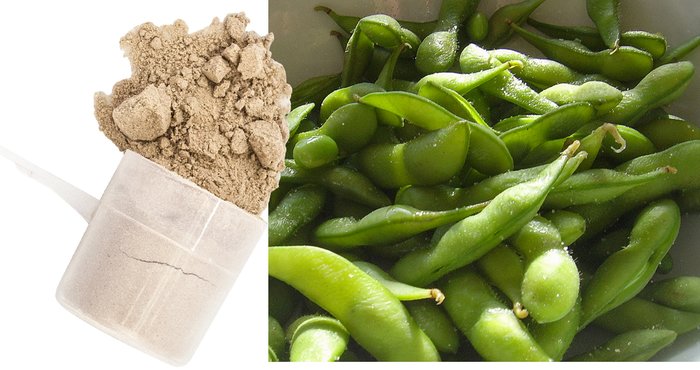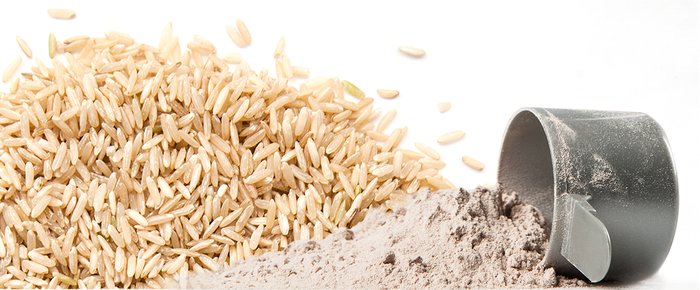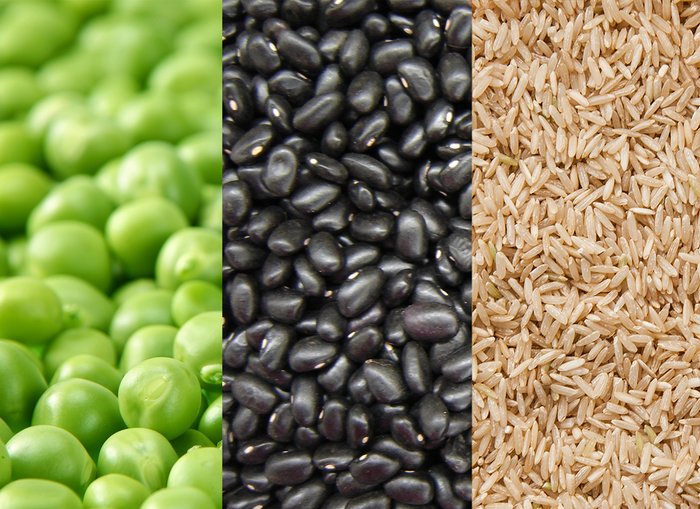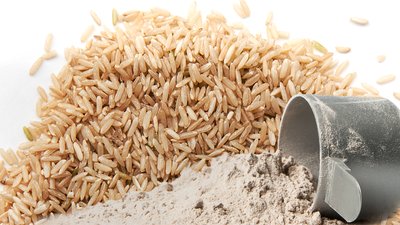In the world of bodybuilding, few things appear to be as misunderstood as vegetarian diets. In fact, some gym-goers will claim the two just don't go together. Say the word "vegan" and most lifters will laugh you out of the gym.
Most of the misinformation comes from the belief that plant-based foods don't provide enough protein to stimulate muscle growth, so they have no place in a bodybuilder's diet. Other skeptics claim using plant-based proteins will cause guys to grow man boobs or fail a drug test.
Some of this may sound silly to you, but let's face it, plant-based proteins have been picked on by members of the bodybuilding community for quite some time now. Blame it on a general lack of knowledge, or the popularity of several myths about plant-based foods, but soy, rice, and hemp have been given the cold shoulder by many.
Whey and casein may always reign supreme when it comes to popular protein powders, but it's time to learn the truth behind these five plant-based myths and see if it's worth your while to add them into your diet.
Myth 1: Soy Will Give You Man Boobs
This is the myth that refuses to die among lifters. Soy protein has been sworn off by many in the bodybuilding community for fear it may lead to an increase in breast tissue and a more feminine appearance. The thinking goes like this: Unlike whey or casein, soy contains phytoestrogens, plant compounds that have a similar structure and function to estrogen.
Yes, it's true that gynecomastia, or swollen male breast tissue, is associated with an imbalance between the hormones estrogen and testosterone. But here's the catch: phytoestrogens don't actually have a direct impact on estrogen levels unless you consume them in really, really large quantities. And even then, it's questionable. In fact, a 2010 study published in Fertility and Sterility concluded that high levels of phytoestrogens did not cause gynecomastia or any other feminizing effects in healthy men.[1]
For now, there is no research showing that soy has a feminizing effect, so rest easy knowing you won't be growing moobs anytime soon if you eat some tofu or have a soy-based protein smoothie. And if you're still looking for a reason to include soy in your diet, there are several studies that have shown a lower incidence of cancer—specifically breast, colon, and prostate—in those countries that have a higher soy-consumption rate.[2-4]

Don't fear the soy! Phytoestrogens, the plant compounds found in soy, have no direct impact on estrogen levels.
Myth 2: Pea Is A Complete Protein Source
You've probably heard that plant-based proteins (with the exception of soy) are incomplete proteins, meaning they don't contain enough of the essential amino acids to maximally stimulate protein synthesis. So why is pea protein sometimes described as a complete protein source? It has something to do with the fact that the essential amino-acid profile of pea protein nearly matches that of common animal sources that are complete proteins—nearly, but not completely.
While pea protein does in fact contain all nine essential amino acids, three of the amino acids— methionine, tryptophan, and valine—are very low in quantity. Because of this, pea is for all intents and purposes an incomplete protein and should normally be paired with a complementary protein, like brown rice protein, to be nutritionally more complete.
Here's the good news: Most pea protein powders available on the market are already mixed with brown rice protein, giving you a gluten-free, non-dairy complete protein that tends to mix more easily in water than pea protein alone. Because let's face it, no one enjoys a clumpy smoothie!
Myth 3: Incomplete Proteins Have No Benefit At All
This seems to go against what I just wrote, but hear me out. Although rice protein, like most other plant proteins, lacks specific essential amino acids, there is research supporting its use to stimulate muscle protein synthesis, in addition to a number of other health benefits.
A study published in Nutrition Journal in 2013 specifically studied rice protein isolate supplementation in comparison to whey protein. Rice protein was associated with improvements in body composition, strength, and power comparable to the whey protein isolate supplementation.[5] Surprising, right?
So yes, you should have all the essential amino acids present and accounted for in ample doses most of the time. But it's also true that nearly all of us are getting plenty of amino acids in our diet throughout the day. So don't fear the occasional incomplete protein!
Additionally, although the research on rice protein supplementation is limited, it's often lower in cholesterol and sodium than animal protein sources like whey, and may be a heart-healthy alternative for individuals watching their blood pressure.

Rice protein, which is often lower in cholesterol and sodium, is a great alternative for individuals monitoring their blood pressure or concerned about heart disease.
Myth 4: Hemp Protein Will Make You Fail A Drug Test
In the spirit of "there are no dumb questions except the ones that don't get asked," I won't ridicule anyone for wondering this. But rest assured, you won't fail a drug test after drinking hemp protein powder. And no, you can't get high from drinking it either.
Although hemp and marijuana both come from the same plant, Cannabis sativa L., industrial hemp contains only 0.3-1.5 percent tetrahydrocannabinoids (THC), the intoxicating ingredients that make you high. That's not nearly enough to feel anything or get a reading. And not only are the THC levels in hemp foods barely measurable, hemp contains a relatively high percentage of another cannabinoid, cannabidiol (CBD), that actually blocks the marijuana high.[6,7]
Hemp protein may not be a complete protein on its own, but it does offer up some unique benefits. For one, hemp protein powder has high digestibility, which means that the bioavailability is above average, allowing your body to make quicker use of the amino acids. Hemp protein powder is also higher in fiber and omega-3s than pretty much any other protein, which could offer up additional health and weight-loss benefits.
One other benefit you might not know: The oiliness of the hemp seed naturally deters insects and pests, which may help you reduce your exposure to toxic insecticides or pesticides.
Myth 5: Plant-Based Protein Is High In Carbohydrates
Many common vegetarian and vegan protein sources come from grains and legumes, which are higher in carbohydrates compared to meat and dairy. People who consume protein powder usually want to add protein to their diet, not additional carbohydrates. This is especially true for anyone following a low-carbohydrate or Keto diet—can't waste those precious carbs on a shake! This belief leads them to disregard plant-based proteins without ever looking at the label to check the accuracy of their assumptions.

Pea protein, which is considered an incomplete protein, should be paired with a complementary protein, like rice, to form a complete protein.
The truth is, although plant sources like rice are often categorized as relatively high-carbohydrate foods, they can be a great source of vegetable protein. When they get manufactured into protein supplements, the carbohydrates in these high-protein grains are largely eliminated, while the amino-acid profile is improved. This is also true for quinoa, lentil, and chickpea proteins.
Here's how some of the most popular brands on the market stack up in grams of protein per serving:
- SAN Rawfusion : 21 g, carbs 5 g
- MRM Veggie Elite : 24 g, carbs 5 g
- Vega Sport Performance Protein : 30 g, carbs 5 g
- NOW Pea Protein : 24 g, carbs 1 g
- Gardenia Vegan Protein : 20 g, carbs 7 g
- Garden of Life Raw Organic Protein: 17 g, carbs 3 g
Most of the popular whey protein powders on the market contain at least 3 grams of carbs to go along with their 20 or so grams of protein, so the playing field is pretty close to level. Given that many plant-based proteins also bring a broader array of crucial nutrients to your bottle than a whey smoothie does for the same calorie total, the competition is a lot closer than you might think.
The takeaway : Don't fear vegetable or vegan protein! It has a lot to offer you, and the downsides might not be nearly as big as you think.
References
- Hamilton-Reeves, J. M., Vazquez, G., Duval, S. J., Phipps, W. R., Kurzer, M. S., & Messina, M. J. (2010). Clinical studies show no effects of soy protein or isoflavones on reproductive hormones in men: results of a meta-analysis. Fertility and Sterility, 94(3), 997-1007.
- Messina, M. J., Persky, V., Setchell, K. D., & Barnes, S. (1994). Soy intake and cancer risk: a review of the in vitro and in vivo data. Nutrition and Cancer, 21(2), 113-131.
- Trock, B. J., Hilakivi-Clarke, L., & Clarke, R. (2006). Meta-analysis of soy intake and breast cancer risk. Journal of the National Cancer Institute, 98(7), 459-471.
- Badger, T. M., Ronis, M. J., Simmen, R. C., & Simmen, F. A. (2005). Soy protein isolate and protection against cancer. Journal of the American College of Nutrition, 24(2), 146S-149S.
- Ross, S. A., Mehmedic, Z., Murphy, T. P., & El Sohly, M. A. (2000). GC-MS analysis of the total delta-9-thc content of both drug-and fiber-type cannabis seeds. Journal of Analytical Toxicology, 24(8), 715-717.
- Holler, J. M., Bosy, T. Z., Dunkley, C. S., Levine, B., Past, M. R., & Jacobs, A. (2008). Delta-9-Tetrahydrocannabinol content of commercially available hemp products. Journal of Analytical Toxicology, 32(6), 428-432.
- Joy, J. M., Lowery, R. P., Wilson, J. M., Purpura, M., De Souza, E. O., Wilson, S. M., ... & Jäger, R. (2013). The effects of 8 weeks of whey or rice protein supplementation on body composition and exercise performance. Nutrition Journal, 12(1), 1.

